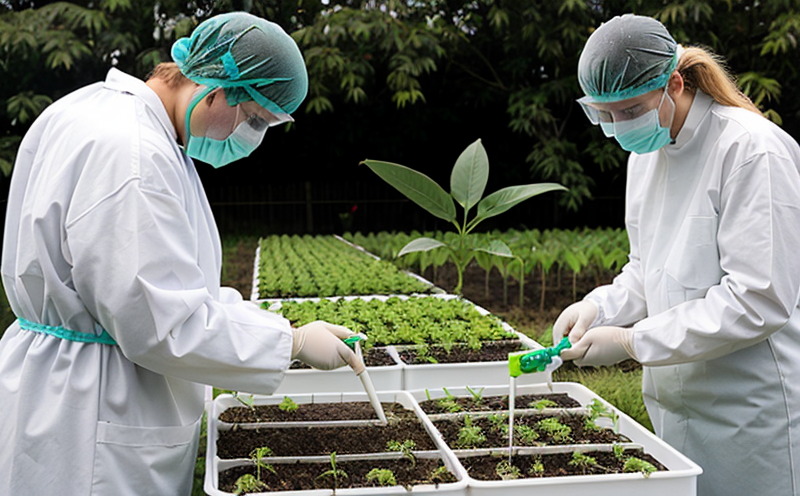Phytophthora Infestans (Late Blight) Testing
The Phytophthora infestans pathogen is a significant threat to potato and tomato crops worldwide, causing late blight disease which can lead to severe yield losses. This testing service ensures the quality of agricultural products by identifying the presence or absence of this pathogen in plants and tissues.
Phytophthora infestans, commonly known as late blight, has a complex life cycle that includes both sexual and asexual stages. The asexual stage produces sporangia which can be carried long distances via wind, rain, or human activities, making it highly mobile and capable of causing rapid outbreaks. Early detection is crucial for implementing effective management strategies.
Our testing service utilizes advanced molecular techniques such as Real-Time PCR (RT-PCR) to detect the presence of Phytophthora infestans DNA in plant samples. This method offers high sensitivity, specificity, and speed, allowing for precise diagnosis even at very low levels of infection. Additionally, we use isolation methods based on cultural growth to confirm the identity of detected isolates.
The testing process begins with proper sample collection from affected areas or suspected plants. Samples should be collected early in the morning when symptoms are most visible and kept cool until processing. Our team will then extract DNA from these samples for further analysis using our state-of-the-art laboratory equipment. Once analyzed, results are provided within a specified timeframe depending on the urgency of the request.
This service is particularly beneficial for farmers, breeders, and researchers who need reliable data to make informed decisions about crop management practices or breeding programs aimed at developing resistant varieties. By detecting Phytophthora infestans early on, it helps prevent widespread epidemics, protecting valuable agricultural resources.
Our rigorous quality control measures ensure accurate results every time, adhering strictly to international standards such as ISO 17025 for proficiency in testing and calibration. This guarantees that our findings are accepted by regulatory bodies and stakeholders globally.
The importance of this service cannot be overstated given the economic impact late blight can have on global food security. Accurate identification allows farmers to adopt integrated pest management practices effectively, reducing reliance on chemical treatments while maintaining crop health.
Scope and Methodology
The scope of our Phytophthora infestans testing service encompasses the full range of agricultural products susceptible to late blight disease. This includes potatoes (both tubers and sprouts) as well as tomatoes, peppers, eggplants, and other members of the Solanaceae family.
Our methodology involves several key steps:
- Sample collection from affected fields or plant parts suspected to be infected.
- DNA extraction followed by Real-Time PCR amplification targeting specific regions within the Phytophthora genome.
- Cultural isolation of any detected isolates for further verification if necessary.
- Comprehensive data analysis and interpretation leading to accurate diagnosis reports.
The choice between molecular detection (RT-PCR) and cultural methods depends on the specific requirements of the client. Molecular techniques offer faster turnaround times but may sometimes miss very low-level infections, whereas cultural methods provide definitive evidence which can be crucial for regulatory purposes.
International Acceptance and Recognition
The Phytophthora infestans testing service we offer meets the highest standards set by international organizations like the Food and Agriculture Organization (FAO) of the United Nations. These bodies recognize real-time PCR as an effective tool for detecting plant pathogens, including late blight.
Our results are accepted not only domestically but also internationally, ensuring seamless compliance with global trade agreements and certification requirements. This is particularly important in markets where stringent import regulations are enforced to protect local agriculture from foreign diseases like Phytophthora infestans.
The World Organisation for Animal Health (OIE) and the International Plant Protection Convention (IPPC) also acknowledge molecular diagnostic tools as part of their guidelines for disease surveillance. By aligning ourselves with these global standards, we contribute towards maintaining plant health worldwide.
Competitive Advantage and Market Impact
In today’s competitive agricultural landscape, having a reliable testing service is essential for staying ahead. Our Phytophthora infestans testing offers several advantages:
- Early detection of the pathogen helps in implementing preventive measures promptly.
- Reduces the need for excessive pesticide use through targeted interventions only where needed.
- Maintains product quality and safety throughout supply chains.
- Promotes sustainable farming practices by supporting better decision-making processes.
The market impact of our service extends beyond individual farms; it contributes significantly to maintaining international trade flows. By preventing the spread of late blight, we help ensure that high-quality agricultural products reach their destinations on time without disruptions caused by quarantine issues or recalls due to contamination.





